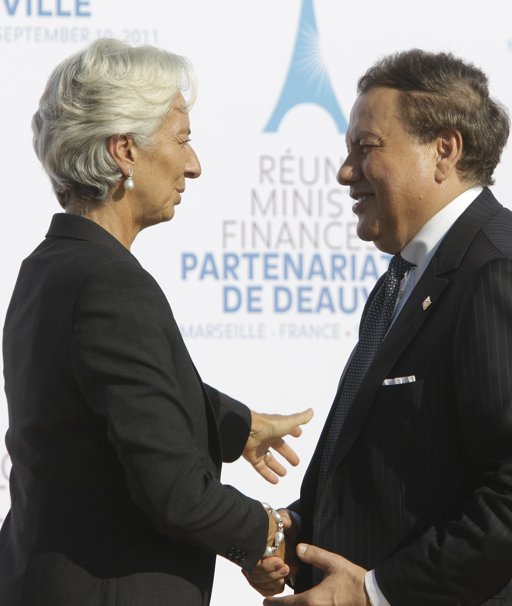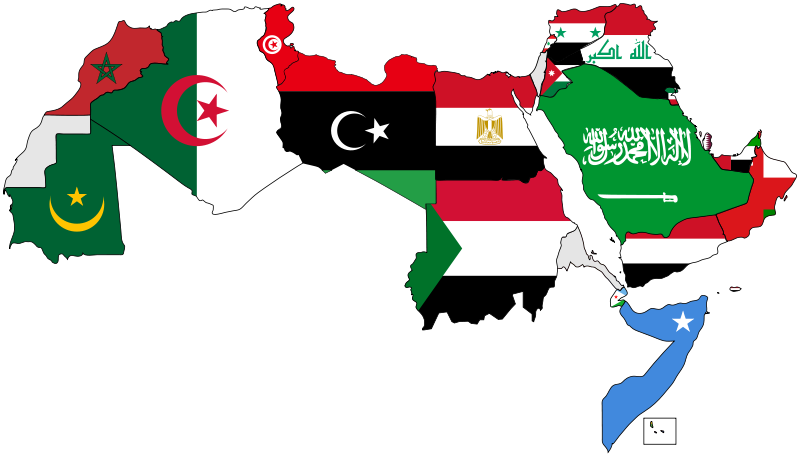By GREG KELLER - AP Business Writers,SARAH DiLORENZO - AP Business Writers | AP – September 10, 2011

International Monetary Fund (IMF) managing director Christine Lagarde, left, chats with Russian deputy Finance Minister Sergey Storchak during a Deauville partnership meeting in Marseille, southern France, Saturday, Sept.10, 2011. The Deauville Partnership is a multi-billion-dollar program of aid and credit to Egypt and Tunisia that was agreed at a G8 summit in Deauville last May. Rich countries and international lenders are aiming to provide $40 billion in funding for Arab nations trying to establish true democracies. (AP Photo/Claude Paris)
***************************************************************
MARSEILLE, France (AP) — Wealthy countries and international lenders (出借人, 贷方) promised more money Saturday to encourage democratic reforms in Arab nations, promising at least $58 billion.
After Tunisia and Egypt ousted their authoritarian regimes earlier this year, eight of the world's most developed economies along with rich Arab countries and a raft (大量,原意:筏子) of development banks had pledged in May to give $40 billion in support to their nascent (初生的) democracies and hopefully keep them on the path to open government.
Those uprisings set off a cascade (一连串的进展,原意:瀑布) of revolts (反抗) across the Middle East, and the Group of Eight and others are now increasing their pledges and expanding the recipients to include Morocco (摩洛哥) and Jordan (约旦).
So far, at least $58 billion has been promised to the four countries — $38 billion from development banks through 2013 and more than $20 billion from the G-8 and the wealthy Arab countries.
Saturday's meeting was notable for its inclusion of Libya, where rebel forces recently took control of most of the country and are working to create a government to replace Moammar Gadhafi's regime. Libya is not yet officially part of the program but could soon receive funding, according to Canadian Finance Minister Jim Flaherty.
Libya's vast oil wealth means it is unlikely to need substantial aid over the long term, but its oil exports slowed to a trickle (滴流;缓慢移动) during recent fighting, and the country is still waiting for funds that were frozen under Gadhafi to be handed over to them. Flaherty indicated that the program could bridge the gap.
"We did not discuss quantum (量), but we discussed, yes, the reality that the Libyans may require some assistance in the short term," Flaherty said.
Earlier in the day, British Treasury chief George Osborne said officials would also commit to lifting sanctions (解除制裁) on Libya, unfreezing its assets, and also "significantly get oil production going as quickly as possible."
Libya's new ambassador to France Mansour Seyf al-Nasr called the meeting "a success."
Tunisia's finance minister, Jelloul Ayed, also praised the meeting.
"A very successful meeting. The financial commitment that we obtained today is a general commitment," he said, noting that it would be determined later how much each of the Arab countries gets.
In another step for Libya's Transitional National Council, it won recognition Saturday from the International Monetary Fund, according to the organization's chief, Christine Lagarde. She said she would dispatch teams to Libya to help with technical assistance and policy advice as soon as it was safe.
The money is intended to help support "transparent, accountable government" and "sustainable and inclusive growth" in North Africa and the Middle East, according to a statement from the nine international and regional lenders who pledged the $38 billion.
The plan was hatched in May by the G-8 nations — Britain, Canada, France, Germany, Italy, Japan, Russia and the U.S. — as they sought to support the revolts and reforms inspired by the Arab Spring.
They hope the money will reward — and encourage — reform. The Syrian (叙利亚的)government, which is involved in a bloody crackdown on dissent, was pointedly not invited.
But there has been criticism that the funds have been slow in coming. French Finance Minister Francois Baroin said Saturday that everyone was working to hand over the money as quickly as possible.
Of the lenders, the World Bank is providing the largest share of financing, with $10.7 billion. The African Development Bank has pledged $7.6 billion, the Islamic Development Bank $4.5 billion, with the rest coming from regional development bodies such as the Arab Fund for Economic & Social Development, the Arab Monetary Fund, and the European Bank for Reconstruction and Development.
It wasn't immediately clear how much the G-8 countries were now offering, though Baroin said the commitments had "increased strongly." But he only specified France's new pledge, which has more than doubled to $2.7 billion.
The IMF also has another $35 billion available for lending to the region, with the focus to be on oil-importing countries suffering from rising food and fuel prices.
***************
Notes:




